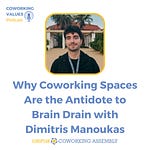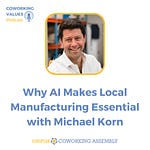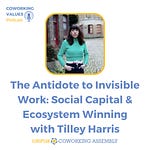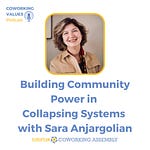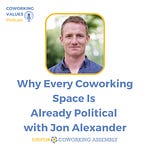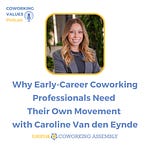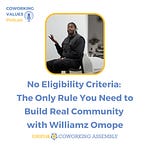Episode Summary
"There's a big bias towards design over engagement. Everyone has fancy glass walls, everyone has sit-stand desks, but the messy spaces are where the magic happens."
David Walker attended the South by Southwest Coworking Conference in 2011, when there were only 50 coworking spaces worldwide. He still has the T-shirt. Today, he's observing an industry he helped develop evolve. Into something unrecognisable — and he's not keeping quiet about it.
This isn't another episode about community-building platitudes. David co-founded Austin's first coworking space in 2008, inadvertently became a coworking consultant, and has spent 16 years observing the movement shift from gritty collaboration to glossy commoditization.
When Bernie admits he feels more at home in spaces that look "a bit smacked up, like a hurricane has just passed through," David doesn't just agree — he explains exactly why those messy edges are where real collaboration lives.
The conversation takes an unexpected turn when David reveals he's just launched a collaboration platform built with AI — not to monetise, but to experiment. It's live, it's free, and it's deliberately unpolished. "I've created the pool for people to come swimming," he says, channelling the same energy that built coworking before it became an industry.
From learning to code by clicking "View Source" on websites to applying improv comedy's "yes and" technique to workspace design, this episode challenges everything we think we know about how collaboration actually works.
Bernie's visceral reaction when David says people can "dive in" to his platform — "That terrified me... It's the thing like Noah Kagan or Seth Godin would have chucked up on the internet in 2008" — captures exactly what we've lost in our rush to professionalise.
For anyone running an independent coworking space, wondering why their carefully designed collaboration zones sit empty, or community managers exhausted by forcing connection in sterile environments, this conversation offers both vindication and a way forward. Not through better design, but through embracing the beautiful mess of actual human collaboration.
⏱ Timeline Highlights
[02:15] David is still wearing his 2011 South by Southwest Coworking Conference T-shirt during recording
[03:45] "Coworking was in its grittiest stage... just a bunch of doers and thinkers and disruptors"
[08:20] Bernie admits "community, coworking, collaboration" on his website meant nothing
[10:30] "Collaboration is multiplication" — David's favourite quote about working together
[11:15] The "yes and" technique from improv comedy that changed David's approach
[14:30] "There's a bias towards design over engagement" — the commoditisation problem
[17:00] Bernie: "I always feel really at home where something looks a bit smacked up"
[19:00] Learning to code by clicking "View Source" — collaboration in public origins
[22:00] David launches an experimental collaboration platform built with AI
[23:05] Bernie's terror: "It's the thing Noah Kagan or Seth Godin would have chucked up in 2008"
[29:00] "If someone said 20,000 coworkers are in this, I'd be exhausted"
[31:00] London meetup diversity story — from Indoor Gardeners to London Shy Meetup
[33:00] "Collaboration itself becomes the content" — the radical shift
[34:50] The ecosystem engine launch — E-squared experiment goes live
🎯 Thematic Breakdown
The Corporate Takeover Nobody Talks About
David doesn't mince words about what's happened to coworking. To compete now, you need fancy glass wall systems, sit-stand desks, and the latest technology.
"You've got to compete with the multimillion-dollar player down the road," he says, and the resignation in his voice tells the real story. The messy ones, the rough-around-the-edges spaces that birthed this movement, can't monetise as well. They're being priced out of their own revolution.
The irony cuts deep. These sterile, high-design environments that win the real estate game are the very spaces where collaboration struggles to breathe. David points to hacker spaces and early coworking spots — places with "stuff in them," quirky toys, unexpected pieces.
Not Instagram-ready, but alive with possibility. When Bernie admits he deliberately seeks out "owner-managed coworking spaces" over the glass-walled alternatives, he's not being nostalgic. He's chasing something real that design consultants can't blueprint.
This isn't just aesthetic preference. It's about what happens when commoditisation replaces co-creation, when the bias toward design overtakes engagement. The original ethos of coworking is "starting to see a different reflection in the mirror, and it doesn't know what to do."
Why Improv Comedy Holds the Secret to Collaboration
David's improv comedy class in Austin taught him something that changed everything: the "yes and" technique. On stage, when someone throws out an idea, you never say no.
You build. You add. You keep the momentum alive. "No idea is a bad idea" when you're truly collaborating, he explains. The process becomes bigger than the participants.
Bernie immediately connects this to his own experience of running events. The panels where speakers deliver pre-packaged wisdom? Dead energy. But when everyone's talking, building together, "collaborating in public" as David calls it — that's when people come alive. David even admits he fast-forwards YouTube videos to the Q&A sections because "that's when the real conversation starts."
Think about that for your next community event. Are you creating stages for performance, or pools for swimming? The difference isn't subtle. One creates consumers of content.
The other creates collaborators in discovery. David's right when he says it's like musicians in a jam session — the magic happens when they stop playing what they prepared and start riffing together.
The View Source Revolution
"I learned to code by clicking View Source," David says, and suddenly we're not talking about websites anymore. We're talking about a philosophy of transparency that built the internet — and could rebuild coworking.
That simple browser feature, created so people could learn from each other, represents everything we've forgotten about collaboration in public.
When David launched his collaboration platform last week, built with AI in true experimental fashion, Bernie's response was visceral: "That terrified me." Not because the platform might fail, but because it represents something we've lost.
The willingness to show the messy middle, to build while people watch, to invite others into the process before it's perfect.
The software industry got this right with open source. Seth Godin got it right when he turned blog posts into books, creating in public as he went.
But somewhere along the way, coworking spaces started hiding their process behind NDAs and stealth mode, competing instead of co-creating. David's platform — free, experimental, deliberately unpolished — feels like a deliberate provocation. "I've created the pool for people to come swimming," he says. Will anyone be brave enough to get wet?
The Meetup Era's Lost Lessons
Bernie's story about the 2008 London Meetup gathering with founder Scott deserves its own meditation. Indoor Gardeners meetup. London Shy Meetup (for people who are too shy to talk but need company).
A soup kitchen run by doctors for people "not at risk enough to qualify for government support, but heading in that direction." This was London's actual diversity, not its marketing version.
What made Meetup revolutionary wasn't the technology. It was permission. Permission to gather around any weird, specific, human need.
Permission to show up without knowing why you're there. As David puts it, "the polished result isn't the goal. It's just the idea of showing up and seeing what happens."
Compare that to today's coworking events. Professional. Polished. Purposeful. And often, empty of the very energy that makes collaboration possible.
The London Shy Meetup members who went to the cinema together and might not speak? They found their people. They transcended what David calls "the stranger society" — that invisible barrier that stops us talking in coffee shops or on the tube.
Small Pools Beat Big Oceans
"If someone said to me, 20,000 coworkers are in this, I'd be exhausted," Bernie admits, and David doesn't argue. There's honesty here about scale that the coworking industry needs to hear.
Bernie thrives in groups of 40, where he can "give my time to at least half of those people and build a relationship." David's just-launched platform has barely any users — and that's the point.
The collaborative magic happens in small pools, not vast oceans. It's why those early coworking spaces worked — not despite being small, but because of it. When you can know everyone's name, when you can track the ripples of each interaction, when the community is small enough that every person matters — that's where multiplication happens.
This challenges everything about growth metrics and scale economics. Maybe success isn't 1,500 people in a Slack channel where Bernie "just couldn't do it."
Perhaps it's 40 people who actually converse with each other. Perhaps it's a beta platform with 10 users who are genuinely collaborating and experimenting together. Maybe small was always beautiful, and we just forgot.
Collaboration as Content (Not Outcome)
David drops something profound almost casually: "collaboration itself becomes the content." Not the polished result. Not the successful project. The messy, uncertain, experimental process of working together. This flips everything about how we design coworking programmes.
Stop trying to engineer outcomes. Start creating conditions for process. David's platform doesn't promise to help you build a successful startup or find your co-founder. It promises a pool where you can swim with others.
The swimming is the point. Bernie gets this viscerally — it's why his Unreasonable Connection events are so effective. Forty minutes in a room with three or four people, talking about "whatever comes up."
When collaboration becomes content, everything shifts. You stop measuring success by what gets produced and start measuring it by what gets explored.
You stop facilitating toward outcomes and start protecting the mess where magic happens. You stop asking, "What did we achieve?" and start asking, "What did we discover?"
🔗 Links & Resources
David Walker's Work
Projects & Community
Bernie's Projects
LinkedIn Coworking Group (Where that 2011 SXSW Photo is!)
Workspace Design Show - Business Design Centre, February 2026
One More Thing
Coworking brings communities together, helping people find and share their voices.
Each episode of the Coworking Values Podcast explores Accessibility, Community, Openness, Collaboration, and Sustainability—values that shape the spaces where we gather, work, and grow.
If this resonates with you, rate, follow, and share the podcast. Your support helps others discover how coworking enriches lives, builds careers, and strengthens communities.
Community is the key 🔑




